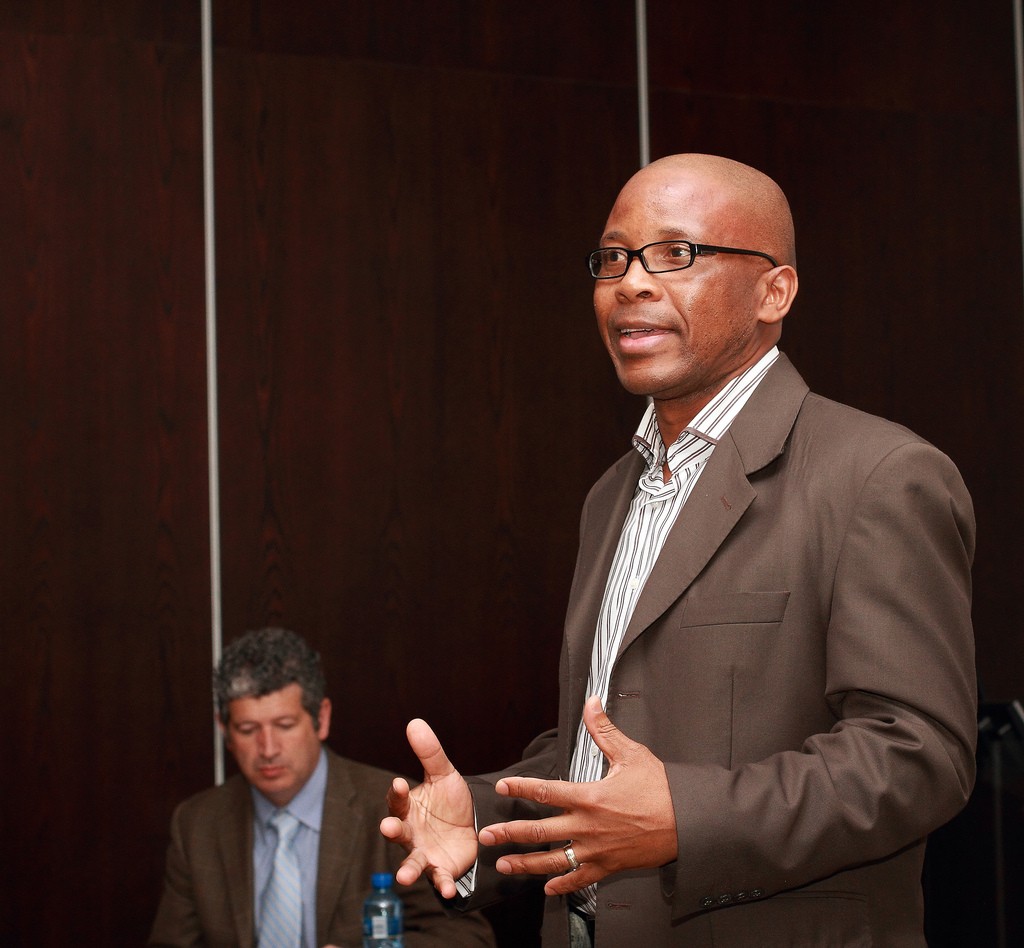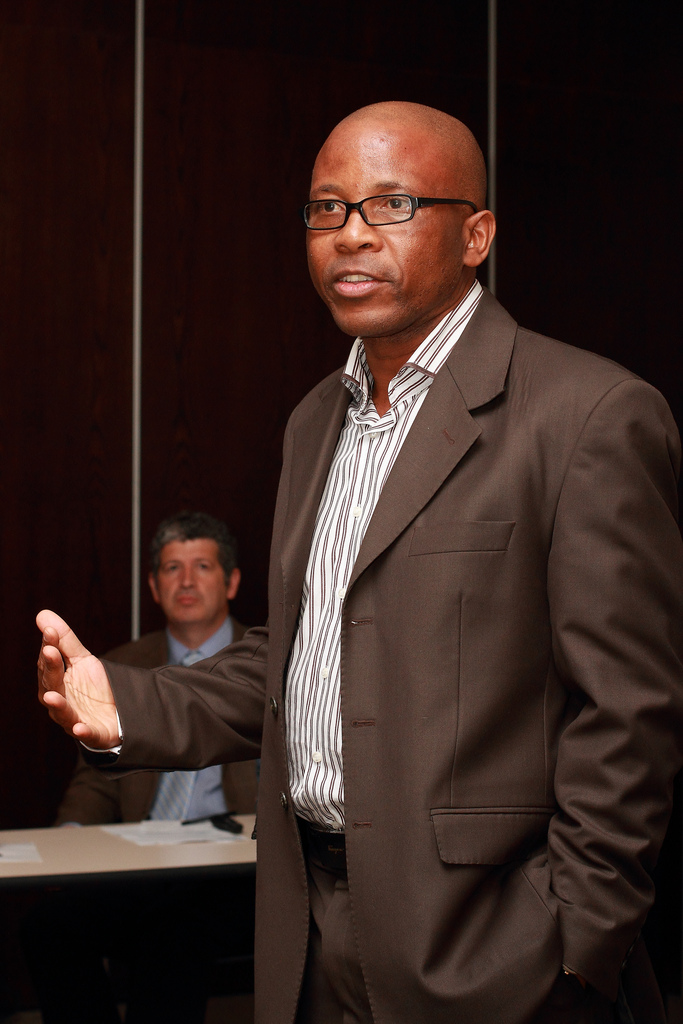MTN South Africa Chief Enterprise Officer Mteto Nyati is a quiet, humble man.
But behind his self-effacing demeanour lies a man with the smarts to run a major organisation and the wisdom and empathy to lead it on a transformation journey, inspiring and motivating staff and peers alike.
By Axel Bührmann
By his own admission, Mteto Nyati is “not the most talkative guy”, and seems nonplussed that I’d personally regard him as an inspiration. But he quickly becomes vocal when asked about the people who inspired him, and even more so when he speaks about his mother.
Both parents were teachers; his father was a principle who went on to become an inspector.
“And my mom branched off from teaching to start a business, a move that had a huge impact on our family’s social standing, lifting it up to a completely different level,” he says.
“She began by selling out of a vehicle and went on to own a big store. But the way she ran those stores was very important for me. How she dealt with her customers is still the way I – now — deal with customers. I understand the value of serving the customer. She sometimes carried customers who couldn’t pay, and even contributed to their children’s education. It went way beyond any normal customer relationship.”
He’s pensive when asked what drove her: “She lived for her kids and after all she had been through, wanted us to be significantly different from her.”
Proudest moment
Top of the list was providing Nyati and his three siblings with the best education available. He says her proudest moment came, when – while attending St. John’s College in Umtata at 17 — he won the South African National Science Olympiad and represented the country in the UK.
“None of the family had ever been abroad,” he chuckles, “and it was very interesting to be recognised in the science space as a black person at that time.”
But why science in the first place? Here, he was largely influenced by the state of his father’s battered old Ford Firenza, which fuelled his passion for all things mechanical.

My parents had never heard of that career and they thought I wanted to become a mechanic they knew. So they were very, very much against it.
“My dad had one of those second-hand cars that continually needed attention,” he says. “I became the mechanic’s helper and thought that what he was doing was fascinating.”
This led to a major misunderstanding at home when the young Nyati firmly announced his chosen career path – mechanical engineering.
“My parents,” he laughs, “had never heard of that career and they thought I wanted to become the kind of mechanic they knew. So they were very, very much against it.”
Stretching and stretching
While studying, a distinguished academic crossed his path, and here we meet Nyati’s second most inspiring person.
“The dean of the university, Professor Zvi Katz, was highly-regarded,” he explains. “He was also very strict and drove us to go beyond what we thought we were capable of. He kept stretching us and stretching us.”
Professor Katz took an interest in Nyati, initially much to the young student’s chagrin.
“He set high standards and at first I felt he was very very hard, but I came to realise he was actually helping me. A lot. And, more recently, when I applied to do an MBA, I asked him to be my referee. He’s one of those guys who really cares about where you’re going.”
Moving on from student days into working life, Nyati’s first employer was Afrox, where we meet the third great inspiration in his life.
“Afrox provided my scholarship,” he explains.
“Here, a gentleman called Neil Greenfield decided he wanted me to be part of his team, and became my guide in the very big transition from university to the work environment. He’s an amazing, amazing guy. Even back then, he was one of those people everybody knew was going to go places. He was around 28 at the time, and had already set himself the goal of retiring at 50.”
Going beyond ‘me’
And here’s where Nyati touches on his lack of loquaciousness. “I’m not the most talkative guy, and in the work setting, you can end up not being used properly because you don’t communicate your thoughts. He drew me out and forced me to be part of a team. Before, to me, teamwork had never really been key — I would only rely on me.”
But Greenfield changed all this by imprinting the importance of teamwork, communication and the ways of doing business on his young colleague. Fast forward several decades, and two years ago, Nyati receives a LinkedIn message from Greenfield.
“It was such a surprise,” he says, with considerable feeling. “I’d been trying to find out where he was, and to thank him for what he did for me. He told me he was living in Germany, but also has a house in South Africa.”
And, Nyati chuckles, “of course” Greenfield told him he had retired.
“He asked to meet, and we had such an emotional meeting at Design Quarters. Here’s this guy who did exactly, exactly what he set out to do. And I could thank him personally for his guiding influence.”
The Colombian connection
More recently, during his sojourn at Microsoft South Africa – which he eventually came to head up – he met his fourth major inspiration.
“As the Microsoft chairman for emerging markets and the chief strategist, national competitiveness, Orlando Ayala is a very senior global leader, and comes from Colombia,” he says.
“Three or four months after I joined Microsoft, he did a presentation at Redmond, where he spoke about his past, where he came from, and where he wanted to take Microsoft – and it all just spoke to me. Somehow I connected with his story: here’s a person from a small country who is very influential in directing and shaping business at Microsoft.”

Where are we going? What is happening? We need to interpret the environment in such a way that everyone can make sense of it.
Nyati introduced himself, and discussed the challenges facing South Africa. He then asked Ayala to be the executive sponsor for the country. While indicating it was feasible, Ayala argued he had to visit the country to understand the local environment.
“He came here, and to cut a long story short, the things we ended up doing at Microsoft South Africa only came about because he was probably the only senior person at Microsoft to provide so much freedom for us to do so much and so quickly. I didn’t have to go through many thousands of tunnels of people when I wanted to get something done.”
To this day, he adds, Ayala remains one of those people he continues to look up to.
Providing clarity
Now the focus shifts to Nyati himself, and I ask him how he sees himself inspiring people.
“Most people are struggling with the many, many challenges of our time,” he responds.
“It could be challenges around finding a way to keep up with what’s going on. Or they can’t make sense out of changes in government, locally or globally. Given my experience of working for a global company, not just in South Africa, but also in Europe and the US, there is so much I can do to try to help people understand.”
Nyati believes one of leadership‘s key functions is to provide clarity.
“Where are we going? What is happening? We need to interpret the environment in such a way that everyone can make sense of it. As difficult as things are, I try to find a way to help people understand. When problems seem huge, people don’t know what to do. They are so confused. But if you provide some clarity, then they feel like they’ve got some control.”
Another personal focus is to make the organisations he works for more relevant in addressing the challenges of their home turf.
“Or, in MTN’s case, of the continent,” he states. “There’s a reason why I chose to work for MTN – it has huge potential to touch people in the right way. We may not be using it like that right now, but we can significantly and positively impact this continent in terms of human development.”

